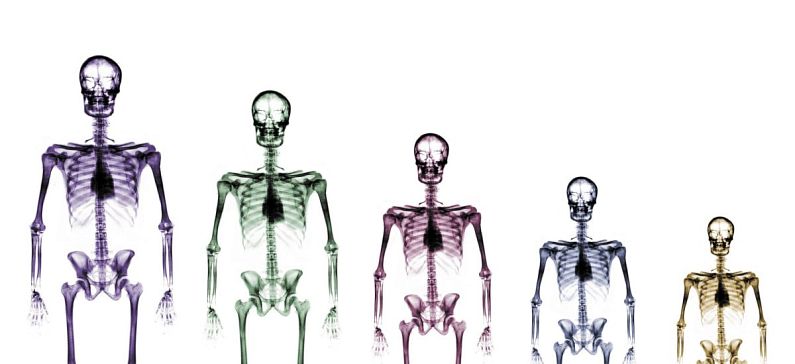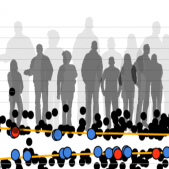
12 Greeks in the team that discovered new genes for height
In the largest, deepest search to date, the international Genetic Investigation of Anthropometric Traits (GIANT) Consortium has uncovered 83 new DNA changes that affect human height. These changes are uncommon or rare, but they have potent effects, with some of them adjusting height by more than 2 cm. The 700,000-plus-person study also found several genes pointing to previously unknown biological pathways involved in skeletal growth. Findings were published online by Nature on February 1, 2017.
The study’s co-senior authors are Joel Hirschhorn of Boston Children’s Hospital and the Broad Institute of MIT and Harvard, Timothy Frayling of the University of Exeter, Panos Deloukas of the Queen Mary University of London and Guillaume Lettre of the University of Montreal.
The rest of the Greek researchers are: Eirini Marouli of Queen Mary University is among the co-first authors, George Dedoussis of Harokopion University of Athens, Fotios Drenos of the Institute of Cardiovascular Science, University College London, Evangelos Evangelou of the Department of Hygiene and Epidemiology in the University of Ioannina Medical School and the Department of Epidemiology and Biostatistics in the School of Public Health in the Imperial College of London, Aliki-Eleni Farmaki of Harokopion University of Athens, Stavroula Kanoni of the William Harvey Research Institute, Barts and The London School of Medicine and Dentistry in the Queen Mary University of London, Maria Karaleftheri of the Echinos Medical Centre, Ioanna Ntalla of the William Harvey Research Institute, Barts and The London School of Medicine and Dentistry in the Queen Mary University of London, Elizabeth K. Speliotes of the Department of Computational Medicine and Bioinformatics in the University of Michigan, Emmanouil Tsafantakis of the Anogia Medical Centre, Eleftheria Zeggini of the Wellcome Trust Sanger Institute.
“The new genetic variants we found are rare in the population but their large effects on human height have revealed important new insights into human skeletal growth. The identified genes will be helpful in predicting a person’s risk of developing certain growth disorders. There is also the hope that we may one day be able to use this knowledge to develop a precision medicine approach for dealing with growth disorders” Deloukas said.
“While our last study identified common height-related changes in the genome, this time we went for low-frequency and rare changes that directly alter proteins and tend to have stronger effects,” says Joel Hirschhorn, MD, PhD, of Boston Children’s Hospital and the Broad Institute of MIT and Harvard, chair of the GIANT Consortium and co-senior investigator on the study together with researchers at the Montreal Heart Institute, Queen Mary University, the University of Exeter, UK, and nearly 280 other research groups.
“The success of our study was due to our large sample size. Our results suggest that our genetic approach works. We can now start identifying similar genetic variations that may influence the risk of developing common diseases such as diabetes, cancer, schizophrenia and cardiovascular disease, to name just a few.” Deloukas explained.
In 2014, GIANT, studying roughly 250,000 people, brought the total number of known genetic variants to nearly 700 — in more than 400 spots in the genome. This effort involved a powerful method called genome-wide association study (GWAS), which rapidly scans across the genomes of large populations for markers that track with a particular trait. GWAS are good at finding common genetic variants, but nearly all of the identified variants alter height by less than 1 mm (less than 1/20 of an inch). GWAS studies are not as good at capturing uncommon genetic variants, which can have larger effects. Finally, the common variants that track with traits tend to lie mostly outside the protein-coding parts of genes, making it harder to figure out which genes they affect. Adult height is mostly determined by the information encoded in our DNA – children from tall parents tend to be taller, and those from short parents are shorter. But growth from a small baby into an adult, and the role of genetics, is one of the most poorly understood areas of human biology.
So in the new study, the GIANT investigators used a different technology: the ExomeChip, which tested for a catalogue of nearly 200,000 known variants that are less common and that alter the function of protein-coding genes. These variants point more directly to genes and can be used as a shortcut to figuring out which genes are important for a specific disease or trait. Most had not been assessed in prior genetic studies of height. Using ExomeChip data from a total of 711,428 adults (an initial 460,000 people and about 250,000 more to validate the findings), the investigators identified 83 uncommon variants associated with adult height: 51 “low-frequency” variants (found in less than 5 percent of people) and 32 rare variants (found in less than 0.5 percent).
With these new findings, 27.4 percent of the heritability of height is now accounted for (up from 20 percent in earlier studies), with most heritability still explained by common variants. Twenty-four of the newly discovered variants affect height by more than 1 cm (4/10 of an inch), larger effects than typically seen with common variants.
These rare variants not only had large effects but also pointed to dozens of genes as important for skeletal growth. Some of these genes were already known, but many (including SUSD5, GLT8D2, LOXL4, FIBIN, and SFRP4) have not previously been connected with skeletal growth.
One gene of particular interest, STC2, had two different DNA changes that both had larger effects on height. Though the variants are quite rare (frequency of 0.1 percent), people with either of these changes were 1-2 cm taller than non-carriers. Further investigations by co-authors Troels R. Kjaer and Claus Oxvig of Aarhus University (Denmark) suggested that the variants influence height by affecting the availability of growth factors in the blood. “The STC2 protein serves as a brake on human height, validating it as a potential drug target for short stature,” says Hirschhorn.
Read also:
Panos Deloukas: Researches longevity and human height genes
Eleftheria Zeggini: Professor of Statistical Genetics at the Wellcome Trust Sanger Institute









